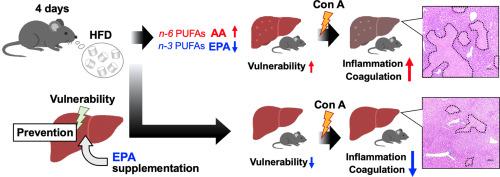二十碳五烯酸对短期高脂饮食加重刀豆蛋白a所致肝损伤的预防作用
IF 4.9
2区 医学
Q1 BIOCHEMISTRY & MOLECULAR BIOLOGY
引用次数: 0
摘要
代谢功能障碍相关脂肪性肝炎是代谢功能障碍相关脂肪性肝病(MASLD)的晚期,与肝硬化和肝癌进展相关。尽管早期干预至关重要,但针对MASLD早期阶段的研究有限。MASLD患者可能存在n-3和n-6多不饱和脂肪酸(PUFAs)失衡。在先前开发的短期高脂肪饮食(HFD)模型(C57BL/6,男性)中,我们证明仅4天的高脂肪饮食摄入就会加重豆豆蛋白a (Con a)诱导的肝损伤(10 mg/kg),这表明即使在没有临床症状的情况下,肝脏易损性也会增加。本文研究了早期HFD暴露时n-3和n-6 PUFA水平的变化及其相关炎症机制,以探索MASLD的早期预防策略。采集饲喂hfd小鼠的肝脏和血清样品4 d,采用气相色谱-质谱法分析n-3和n-6 PUFA水平。结果显示,肝脏和血清中的二十碳五烯酸(EPA)水平下降,而花生四烯酸(花生四烯酸,一种n-6 PUFA,具有抗炎作用)水平上升。进一步分析表明,补充EPA (100 mg/kg)(在短期摄入HFD期间减少)可显著减轻Con - a诱导的肝损伤恶化,主要是由于其抗炎和抗凝血作用。这些小鼠研究结果表明,早期补充EPA可以有效预防肝损伤,甚至在出现临床症状之前降低MASLD进展的风险。本文章由计算机程序翻译,如有差异,请以英文原文为准。

Preventive effect of eicosapentaenoic acid on the exacerbation of concanavalin A–induced liver injury aggravated by a short-term high-fat diet
Metabolic dysfunction-associated steatohepatitis is an advanced stage of metabolic dysfunction-associated steatotic liver disease (MASLD) and is associated with progression to cirrhosis and liver cancer. Although early intervention is crucial, studies focusing on the early stages of MASLD are limited. Patients with MASLD are expected to have an imbalance of n-3 and n-6 polyunsaturated fatty acids (PUFAs). In a previously developed short-term high-fat diet (HFD) model (C57BL/6, male), we demonstrated that only 4 d of HFD intake exacerbated concanavalin A (Con A)–induced liver injury (10 mg/kg), suggesting increased liver vulnerability even in the absence of clinical symptoms. Herein, alterations in n-3 and n-6 PUFA levels and related inflammatory mechanisms during early HFD exposure were investigated to explore early prevention strategies for MASLD. Liver and serum samples were collected from HFD-fed mice for 4 d and analyzed for n-3 and n-6 PUFA levels using gas chromatography–mass spectrometry. The results revealed that levels of eicosapentaenoic acid (EPA), an n-3 PUFA known for its anti-inflammatory effects, decreased in the liver and serum, whereas the levels of arachidonic acid, an n-6 PUFA that promotes inflammation, increased. Further analysis showed that supplementing EPA (100 mg/kg), which was reduced during short-term HFD intake, significantly mitigated the worsening of Con A-induced liver injury, primarily owing to its anti-inflammatory and anticoagulant effects. These findings in mice suggest that early EPA supplementation may effectively prevent liver injury and reduce the risk of MASLD progression, even before the emergence of clinical symptoms.
求助全文
通过发布文献求助,成功后即可免费获取论文全文。
去求助
来源期刊

Journal of Nutritional Biochemistry
医学-生化与分子生物学
CiteScore
9.50
自引率
3.60%
发文量
237
审稿时长
68 days
期刊介绍:
Devoted to advancements in nutritional sciences, The Journal of Nutritional Biochemistry presents experimental nutrition research as it relates to: biochemistry, molecular biology, toxicology, or physiology.
Rigorous reviews by an international editorial board of distinguished scientists ensure publication of the most current and key research being conducted in nutrition at the cellular, animal and human level. In addition to its monthly features of critical reviews and research articles, The Journal of Nutritional Biochemistry also periodically publishes emerging issues, experimental methods, and other types of articles.
 求助内容:
求助内容: 应助结果提醒方式:
应助结果提醒方式:


